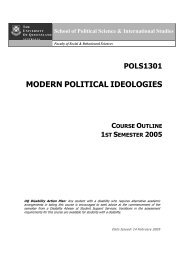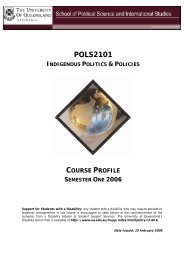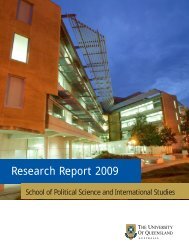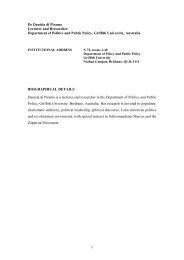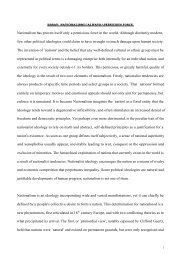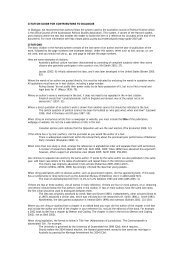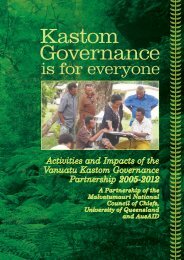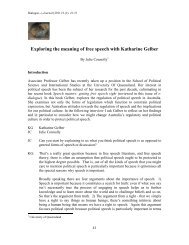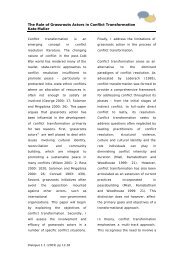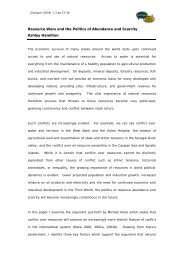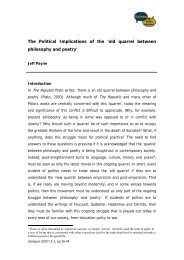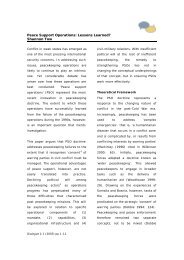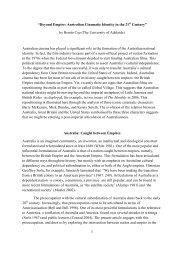POLS1301 - School of Political Science and International Studies ...
POLS1301 - School of Political Science and International Studies ...
POLS1301 - School of Political Science and International Studies ...
You also want an ePaper? Increase the reach of your titles
YUMPU automatically turns print PDFs into web optimized ePapers that Google loves.
WEEK 7 DEMOCRACY 10 -13 APRIL<br />
Key Terms:<br />
Sovereignty <strong>of</strong> the people, recognition, representation, participation.<br />
Questions for Discussion:<br />
1. What is involved in the idea that ‘the people’ should rule themselves? Who are ‘the people’ <strong>and</strong>, if<br />
they are to rule, what does that require <strong>of</strong> political institutions?<br />
2. What conditions are conducive to democratic participation? Do differences <strong>of</strong> wealth, culture <strong>and</strong><br />
gender undermine the possibilities <strong>of</strong> democracy?<br />
3. What are the causes <strong>of</strong> political apathy in society today? Is cynicism about politics necessarily an<br />
unhealthy democratic phenomenon?<br />
Required Reading<br />
Heywood, Andrew. 2003. <strong>Political</strong> Ideologies. An Introduction, 3rd ed. London: Macmillan. pp.319-326.<br />
AND at least one <strong>of</strong> the following from the Course Reader:<br />
Dunn, John. 1993. Western <strong>Political</strong> Theory in the Face <strong>of</strong> the Future. Cambridge: Cambridge<br />
University Press. ‘Democratic Theory’.<br />
Nasr, Vali. 2005. ‘The Rise <strong>of</strong> “Muslim Democracy’. Journal <strong>of</strong> Democracy 16(2): 13-20.<br />
Pateman, Carole. 1989. The Disorder <strong>of</strong> Women. Cambridge: Polity Press. ‘Feminism <strong>and</strong> Democracy’,<br />
pp. 210-225.<br />
Sen, Amartya. 1999. ‘Democracy as a Universal Value’. Journal <strong>of</strong> Democracy 10(3): 3-17. (Not in<br />
Course Reader but available on-line via UQ library).<br />
MID-SEMESTER BREAK - NO CLASSES<br />
17 – 22 APRIL<br />
WEEK 8 NEO-LIBEALISM AND THE NEW RIGHT 24 – 28 APRIL<br />
Questions for Discussion:<br />
1. Why is it said that Neo-Liberalism is a revival <strong>of</strong> Classical Liberalism? In what ways are<br />
they alike? What are the differences?<br />
2. In your view, what are the strengths <strong>of</strong> neo-liberalism? Does it have any detrimental<br />
effects in Australia or in the world at large?<br />
3. On what grounds do social liberals <strong>and</strong> social democrats criticise neo-liberalism?<br />
4. The alliance <strong>of</strong> neo-liberals <strong>and</strong> conservatives is <strong>of</strong>ten called ‘The New Right’. Where do<br />
you see this in Australia – or in the world – today?<br />
<strong>POLS1301</strong> Modern <strong>Political</strong> Ideologies<br />
Course Pr<strong>of</strong>ile<br />
Semester One - 2006 Page # 21



